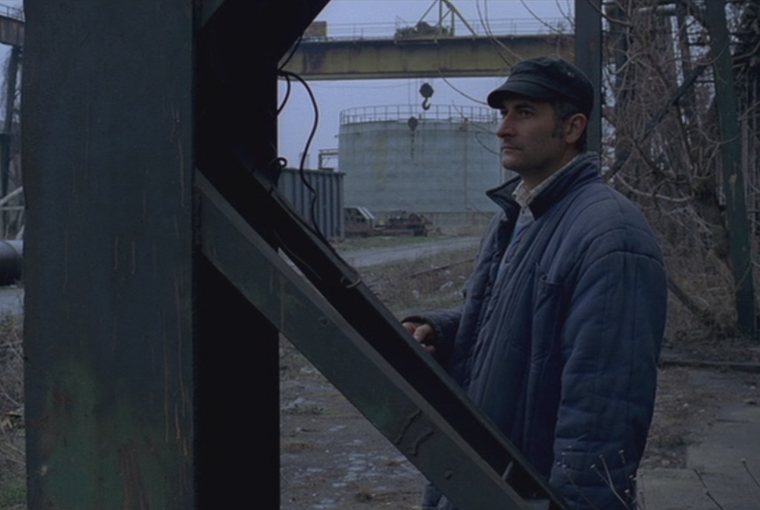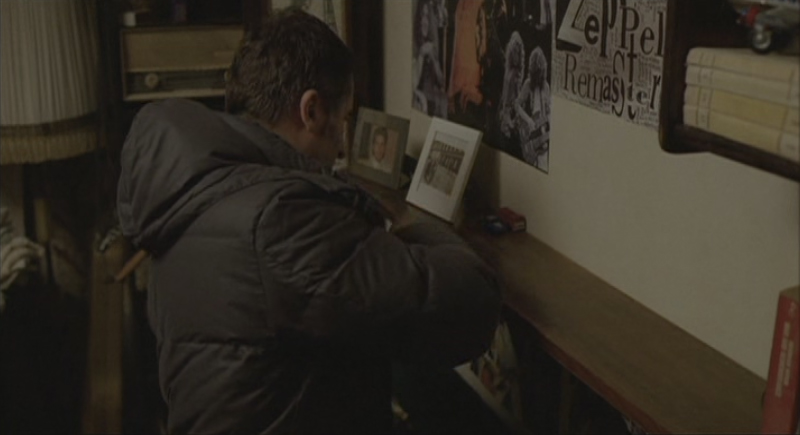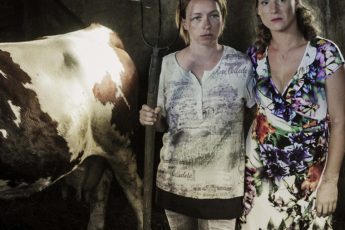
In Cristi Puiu’s Aurora, an engineer in his forties strolls around Bucharest for 36 hours killing four people. Viorel, the killer, is tall, quiet, and has a sportive sense for fashion. He is played by the director, who, after admitting that he cannot possibly understand the mentality of a killer, and hence wouldn’t be able to give any useful directions to an actor playing one, decided to do the job himself. During the first hour of the film, before the first two victims are killed in an underground parking lot, we don’t exactly know what Viorel is up to. Mostly, he kills time in a run-down apartment he just moved into and wants to renovate. He moves around on the street, seemingly watching something or someone, eats, drinks and behaves like a normal person. But when Viorel buys equipment for his rifle, purchases a second rifle, makes a prank call, and tests the rifle, the suspicion rises that something might be wrong.
Only at the very end of the film however, as Viorel turns himself in to the police, we understand who his victims were, and why he killed them. Viorel’s wife Amelia left him for another man whom he shoots along with an unknown woman unlucky enough to have accompanied him. The other two victims are Amalia’s parents who live outside the city. But Aurora does not tell the story of a vengeance. There is no tragic pathos in Viorel’s killing spree – he is no Medea – , and it wouldn’t make sense to describe his mechanical composure as a passionate crime.
Viorel’s biggest problem seems to be change. Just like the doctors in The Death of Mr. Lazarescu, he is incapable of facing situations in life that suddenly take on opposite directions. The doctors in this earlier film were incapable of treating a dying patient, sending him from one hospital to another, as if avoiding him would preserve the propriety of their therapeutic rooms. They expulsed death out of their imaginary realm. Viorel acts in the same way regarding the separation from his ex-wife. He doesn’t know how to deal with that change. Deception is at the heart of this film; the murder an attempt to restore reality as it threatens to shake Viorel’s imagination of it. But while Lăzărescu was told from the perspective of the victim, who couldn’t communicate his fatal condition to the people around him, Aurora switches sides. Viorel doesn’t succumb to an access denying reality. He imposes his condition unto the world. The consequences however are at least as deadly.
In almost every scene, Viorel is confronted with someone not representing, in speech or action, what Viorel seemed to expect. This makes it impossible for him to communicate since it turns everyone into a liar. Viorel’s mind is structured like a dictionary (there are other parallels to Police, Adjective in this film) which turns it into a considerable task for him to understand the intuitive talk of other people. Towards the end of the film, Viorel looks for someone called Andrea Bratila, whom he expects working in a men’s boutique. The conversation is worth to restate:
Viorel: Is Andrea Bratila there?
Seller: Who are you?
Viorel: Excuse me?
Seller: Who are you?
Viorel: And who are you?
[…]
Seller: I’m sorry Andrea quit a month ago.
[…]
Seller: She hasn’t worked here since the end of January.
Viorel: Which January? You mean two months ago. You’re getting tangled up in your own lies.
The conversation continues in a similar vain, with Viorel becoming more and more suspicious of some conspiracy going on because he thinks the ladies working in the store are lying. Logically, and from Viorel’s perspective, they are lying. They don’t answer correctly to the question if Andrea is in the store and are unsure about the exact time she left. But most conversations in real life are never logical, and a person able to understand and use communicative rules would have certainly talked differently. The question “who are you?” might have triggered a polite explanation instead of puzzlement over an unanswered inquiry. Clearly Viorel is not capable to understand non-verbal messages, it is not even sure if he understands that the lady he is looking for is not there because she quit her job. Perhaps Viorel doesn’t want to believe what the sellers tell him, but I would suggest that this is not the question. What he wants is something else, namely, consistent information. He is driven by finding objective truths. This is why, in this particular scene, he in fact looses interest in looking for the women he wants to talk to. Ultimately it is more important to perceive that the ladies in the store are not telling the truth.
In another scene, Viorel has lunch in a cheap restaurant and wants to take away a cake he bought but didn’t finish. He asks a servant to wrap up his dish, and she tells him to ask his colleague who says “immediately,” but then finishes serving a different client, who was in line before Viorel. Viorel seems to get nervous, as “immediately” turns into an unannounced “in a moment.” Noticing the restless customer, the waiter asks him to “give [her] a second”, not knowing that this doesn’t help. For Viorel, even the waiter is part of some truth-thwarting plot, not serving him within the mentioned time. The most revealing sequence however is the conversation he has with his mother-in-law a couple of minutes before he shoots her. Not aware of her fate, she invites Viorel to have a coffee in the kitchen and asks him if Pusa, Viorel’s mother, is well:
Viorel: Pusa is fine, why don’t you call her?
Mrs. Livinski: Why would I call her?
Viorel: To ask how she is for instance.
Viorel is like a truth-detector, spying on other people’s “lies” and hypocrisies. Quod autem non est verum, non est. What is not true, is not – this seems to be Viorel’s moral guide-line.
One could analyze every sequence of this film and observe Viorel’s problem with other people’s words and actions. All these scenes, where Viorel speaks to someone else or does “nothing” are not meaningless, as some critics suggested. These scenes might be repetitive but only because repetition is part of their meaning. From the point of view of the main character, repetition is decisive. Viorel systemizes reality, he needs patterns to survive. The function of systemizing reality is to predict events that follow rules. Repeating the same actions for some known outcome is the safest way to discover a pattern, a truth. Systemizing and discovering truths are correlative activities. Why does Viorel give money to his mother-in-law, if he knows that she will never be able to use that money? Why would he order his CD collection in his new apartment, knowing that he will never return there? Why would he bring back toys to his mother’s apartment to place them on a shelve one by one? All these actions provide a repetitive pattern with a predictable outcome. For Viorel, systemizing seems to be a necessary defense mechanism against the chaos of the world. There is no one to interfere into a systemized reality, no one to prove it wrong.
 Viorel lining up toys
Viorel lining up toys
It is easy to systemize toys or CDs, it gets harder to systemize other peoples language, and practically impossible to systemize other people’s emotions. Causal discoveries deliver truths in the form of rules and can only do so in domains that have rules. In the domain of emotions they don’t make sense. Viorel has obvious difficulties in determining ambiguous expressions, non-verbal messages, and human behavior that do not follow rules. This might be why he practically never responds to anybody’s conversation. It’s true: most questions can be answered by the people who asked.
Psychiatrists such as Simon Baron-Cohen consider systemizing a major characteristic of people with autism. I don’t know if it is accurate to suggest that Viorel is autistic or not. But autism means “the state of self” which is a definition that can clearly be attributed to Viorel’s condition. It is certainly true that Viorel is not capable of seeing the world outside of his own changeless reality.
So maybe separating what is said from context and speaker is the only way for Viorel to encounter other people at all. However, this separation excludes the distinct personality of the people he confronts. It is much like separating form from content. If I only consider what you say, and distinguish what you say from your self, then that self no longer matters to me. It could be said by anybody, in any situation. During the scene in the men’s boutique, it is cruelly ironic that Viorel actually asks “and who are you?” since he seems unable to understand the meaning of that question. Viorel’s systematic mind lacks the ability to react to other people’s thoughts and feelings.
The real tragedy in Aurora is thus not lost love, jealousy or whatever because all these emotions are only relevant if Viorel would be able to put himself in the shoes of others. Jealousy for example only works for people who are able to imagine scenes that take place without them, but that they think they would be able to experience. Ironically, jealousy is all about empathy. It is a complex emotion, in which you have to feel like the person you are jealous about, and then perceive yourself feeling like that person (the same process counts for thoughts on a real or unreal third party intruder).
We don’t know why Viorel and Amalia broke up, but we know from the statement Viorel gives to the police, that it was her decision. He also tells the two officers that interrogate him that Amalia believes in everything everybody tells her, which implies that she would believe in phrases like “I love you” if they would come from the lover Viorel shot. So did Viorel want to save Amalia from a libidinal error? This would turn Viorel into an inverted Werther. Werther kills himself with the hope of being recognized posthumously by the person he loves, but who does not love him back. Werther dies for Lotte. But saying that Viorel kills for Amalia, so that she can realize that she never loved her lover, would imply, no matter the perversity of the thought, that he would be capable of empathy, because he would be able to think and feel in the place of Amalia. On an empathetic level, both deaths – the Viorel’s murder and Werther’s suicide – are equal, since they only make sense from the point of view of the loved person. Werther wants to turn his absence into a presence, but this can only work from the point of view of Lotte, the woman he loves. His identification is so strong that he doesn’t perceive the paradox of his suicide (of giving birth to love posthumously), precisely because the object he identifies with stays alive.
Viorel however is no Werther and I doubt that his murder can be explained from his perception of Amalia’s feelings. Of course he denies that Amalia has real feelings for her new love, but he seems to lack the empathetic conditions to ask himself why love has shifted in the first place. There might be a million reasons that could explain the separation that gave reason to his crime. But most of these reasons probably deal with emotions such as love, hate, desire and the like. They are hard to decipher and might even be unknown to the people directly involved with them, meaning Amalia herself. In order to understand these reasons however, empathy is necessary. But Viorel’s mind does not work that way. For Viorel, even change has to follow rules, so it is ultimately logic to assume that there is a known, concrete cause (the lover and the parents-in-law) to a known effect (the separation).
From Viorel’s perspective then, murdering the people that “caused” the separation from his wife, is a pragmatic deed. Aurora is not a film about being evil or demonic. Viorel does not seem to hate his victims, he just wishes them not be there and turns this wish into reality. The murder eliminates the instances that made Viorel’s life less predictable. It tries to reestablish a reality he could rely on. He turns himself in to the police for the same reason, so as to avoid being surprised. Going to the police is not a proof of his self-consciousness, as though a confession would make him understand his crime. He goes to the police because it is the only possible way to master reality’s unpredictable alterations. If Viorel knows what happens, everything is fine.




Leave a Comment